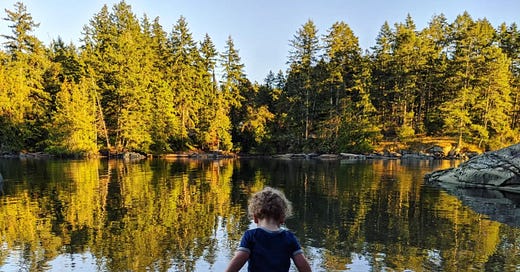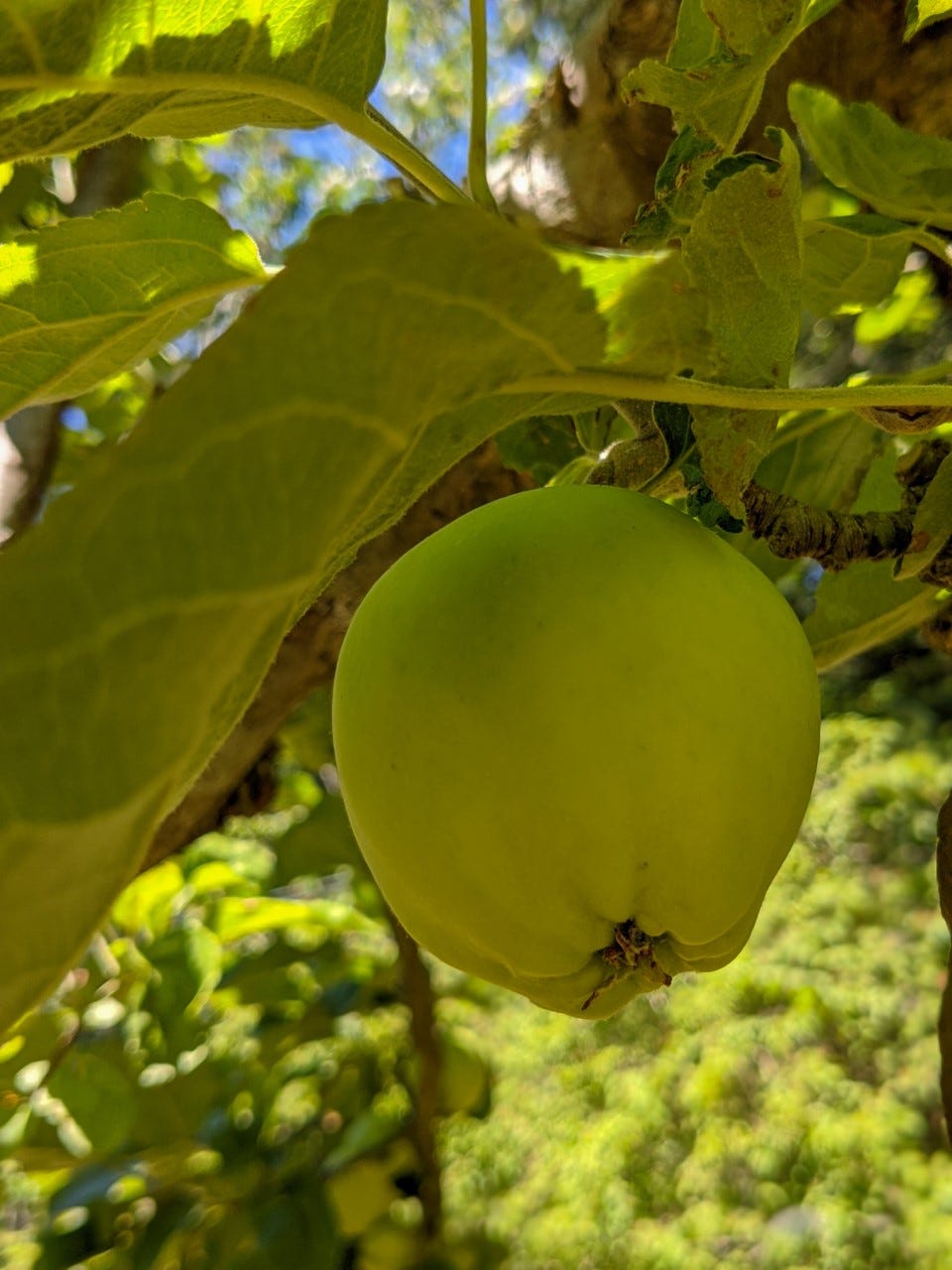Humans are primed to notice what is lacking. We are problem-fixing creatures. In conversation I commonly hear about “the gaps”, where attention is fixated on the space between where we are and where we want to be.
How much does the below ring true?
Deficits. Depletion. A gulf of difficulties.
Incessantly striving for even more. Growth. Higher numbers. Faster results.
Pressure to prove ourselves. Often, with less than before.


Let’s Explore…
My family and I oscillate between the bustling city and a quaint rural life. Wherever I am physically, I find my heart is bound to our tranquil abode located on S,DÁYES, also known as Pender Island. Part of the immense joy I experience comes from our modest orchard, which holds a small variety of plum, apple, pear, and even a young fig tree.
In past years, we harvested a significant bounty. I would be in the garden filling boxes and bags, spending hours upon hours peeling, pickling, and pondering how to make use of the gifts our trees bestowed upon us. Even the local cidery (absolutely divine, I must add) would come each autumn and shake the plentiful Tompkins King for fruit.
This year? I had one bag. One wee bag of Transparent apples (not even cider-worthy, I’m told!).
This was a rough cycle for the trees. First, we had a long-overdue pruning. Then determined tent caterpillars arrived, relentlessly ridding branch after branch of its vitality. The year simply wasn’t in favour of an abundant harvest.
I was dismayed.
What about the jars, the pies, the annual stock of jam that spreads across my toddler’s toast each morning?
My mind jumped to all that wouldn’t be. Somehow in quick order I had equated my success, from as simple as my evaluation of the season to as grand as my value as a mother, to how many jars of jam I produce.
Following my initial disappointment dawned a new awareness. A realization that perhaps, as much as the trees needed it, I, too, needed the rest.
While this illustration is somewhat self-indulgent, it beckons an inquiry into some common patterns:
How often do we assess our own worthiness based on unrealistic expectations surrounding productivity, success, and output? Where our identity and value are wrapped up in observable “progress”?
Not always in forward movement does triumph occur. Sometimes growth is simply in staying still and adjusting awareness. It’s in new perspectives. Rewriting the winding narratives held strongly in our minds.
An Offering to Pause
Recognizing the incessant pace of work and life, I see an opportunity to consider the process of collective recovery and rest. This is of even greater significance considering what many people, teams, and organizations have grappled with over the past couple of years. Instead of pulling ourselves up by our bootstraps and digging into the next milestone or impressive metric, where might there be space to place down the burdens of expectations and instead offer ourselves and each other respite?
With this, a few possibilities emerge:
1. Foster grace
Carl Rogers once wrote: “The curious paradox is that when I accept myself just as I am, then I can change”1. Whatever the situation, what matters here is an awareness to what is present in the moment. Susan David remarks “emotions are data, not directives”2 and goodness do I ever need that reminder frequently.
Developing equanimity towards life’s experiences can be incredibly empowering. I’ve noticed my own tendencies to wrestle with current circumstances. To ruminate over my disappointment. To seek someone or something to blame (such as those pesky tent caterpillars!). In a way, fostering grace is an act of surrendering. It’s coming to peace with what is, with the heart of compassion, which is needed more than ever in these times.
One method which has served me is considering the aspects of my experience. Drawing upon Gervase Bushe’s experience cube framework3, identifying my observations, thoughts, feelings, and wants in any given moment invites both a slowness and sense of yielding. In naming my experience, there's no need to label it as good or bad. Is just is. And with that acceptance and grace, I find choice.
2. Focus on what’s most important
“Words create worlds” - Abraham Joshua Heschel
Noting the nature of deficit-based mindsets, Appreciative Inquiry invites consideration to what gives life and what could be4. It involves examining and creating the best of something or someone to propel positive change. A superb text by Diana Whitney, Amanda Trosten-Bloom, and Kae Rader posits that Appreciative Leadership transforms creative potential into positive ripples that make a difference in the world. This becomes attainable through the art of leading with inquiry and integrity5.
What you nurture grows. Develop intentions that are aligned with who you want to be. In focusing attention on what gives life, whether one’s purpose-driven dreams or a team’s principled action, new possibilities emerge. The opportunity here is to step away from the doing to reflect on the trajectory you aspire to, and shine light on what is working. Then, use these insights to inform decisions about how to spend one’s precious time and generate clarity on roles and capacity.
3. The courage to stand with each other
The sense of being overwhelmed is not a burden to bear in isolation. I’ve written previously about the significance of relationships in fostering wellbeing. Too often, I believe, we hide our struggles from others so not to appear weak or ineffectual. With a brave face, we consider steadfast perseverance a sign of resilience.
“Sometimes the best response to our howls of anguish is the honest one. We need friends who wince along with our pain, who tolerate our gloom, and who allow us to be weak for a while when we’re finding our feet again.“ - Katherine May
The most fulfilling moments in my work come when people realize they are not alone. That others too are challenged and waver in self-doubt. The incredible relief that emerges as someone discovers it isn’t them or a reflection of their leadership is cloaked in gifts of compassion.
What might it be like if we were all a bit more honest about the effort and trade-offs we grapple with? If we become clear and transparent about what takes true exertion and when we need a pause? In my mind, these are the doorways to unearthing common humanity.
4. Take the best first step
It is absolutely acceptable to take small steps. Human Systems Dynamics’s Adaptive Action process encourages the adoption of ‘next wise actions’ when facing complexity and uncertainty6. In noticing the patterns and conditions that exist, thoughtful and informed small steps can generate coherence and sustainability.
Remember, a next step doesn’t need to resemble outwardly progress. Sometimes the most meaningful shifts occur from the nourishment of the mind and body. Katherine May exquisitely describes the deeply human and natural needs for “wintering”7, where slowing provides vital nourishment. With this, mustering your strength results in simply staying still, and not corralling every last semblance of energy for a gigantic leap forward.
This distinction is aptly expressed through Kristin Neff’s work on tender and fierce forms of self-compassion8. Sometimes the best action is advocacy and setting boundaries, such as asking for revisions to timelines and deliverables. Sometimes it’s recognizing the signals of stress and alleviating hardship by seeking solace. Ask yourself and others “what is most needed now?”.
For me, the next best step was taking the hours not spent harvesting and instead relishing in the quiet, gentle pleasures of island life with my beloved. As time progressed, I began to notice a different type of abundance. Rather than a lack of apples, I saw healthy growth with new leafy branches budding from each tree. By investing in thoughtful pruning and other care provided by a local arborist, we’re ensuring the strength of the trees prevail well beyond this harvest season.
A Wish for Grace
As the season turns, I invite you to notice the ebbs and flows of your “progress”. Where do you observe the valleys and peaks of growth and, ultimately, of life?
If your trees or soul need the rest now, please grant it to the best of your abilities. Marvel at the wonder of what is. What is here and now, present in the moment.
With this, I depart with a few graceful words from the poet John O’Donohue:
May the nourishment of the earth be yours,
may the clarity of light be yours,
may the fluency of the ocean be yours,
may the protection of the ancestors be yours.And so may a slow
wind work these words
of love around you,
an invisible cloak
to mind your life.- ‘Beannacht’ by John O’Donohue
Rogers, C. R. (1961). On becoming a person: A therapist's view of psychotherapy. Houghton Mifflin.
David, S. (2016). Emotional agility: Get unstuck, embrace change, and thrive in work and life. Avery.
Bushe, G. (2010). Clear leadership: Sustaining real collaboration and partnership at work. Quercus.
Ludema, J. D., Whitney, D., Mohr, B. J., & Griffin, T. J. (2003). The appreciative inquiry summit: A practitioner's guide for leading large-group change. Berrett-Koehler Publishers Inc.
Whitney, D., Trosten-Bloom, A., & Rader, K. (2010). Appreciative leadership. McGraw-Hill Professional Publishing.
“Adaptive Action” by Human Systems Dynamics Institute. Retrieved from https://www.hsdinstitute.org/resources/adaptive-action.html
May, K. (2020). Wintering: The power of rest and retreat in difficult times. Riverhead Books.
For more on this, I highly recommend listening to the On Being podcast episode featuring Katherine May
Neff, K. (2021). Fierce self-compassion: How women can harness kindness to speak up, claim their power, and thrive. Harper Wave.





